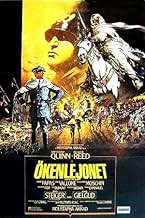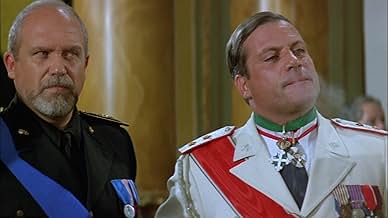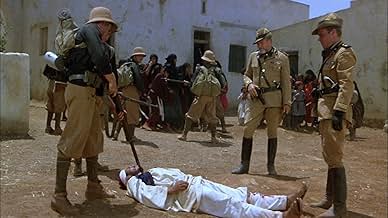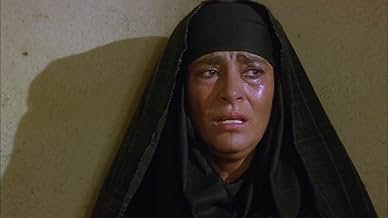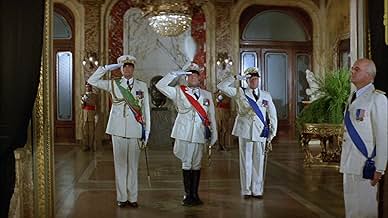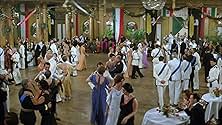En 1929, el dictador Benito Mussolini nombra al general Rodolfo Graziani como gobernador de una región de Libi,a con órdenes de acabar con toda resistencia de los nacionalistas liderados por... Leer todoEn 1929, el dictador Benito Mussolini nombra al general Rodolfo Graziani como gobernador de una región de Libi,a con órdenes de acabar con toda resistencia de los nacionalistas liderados por Omar Mukhtar.En 1929, el dictador Benito Mussolini nombra al general Rodolfo Graziani como gobernador de una región de Libi,a con órdenes de acabar con toda resistencia de los nacionalistas liderados por Omar Mukhtar.
- Dirección
- Guionistas
- Elenco
- Prince Amadeo
- (as Sky Dumont)
- Dirección
- Guionistas
- Todo el elenco y el equipo
- Producción, taquilla y más en IMDbPro
Opiniones destacadas
Director Moustapha Akkad (The Message) clearly learnt a few lessons from "Lawrence of Arabia", mainly how best to use the charismatic Anthony Quinn. As Mukhtar, Quinn gives a nuanced portrayal of compassion and wisdom. Whenever he features in a scene, it becomes impossible to tear one's eyes off the screen. Thankfully, Oliver Reed proves a magnificently cruel and seething counterpoint as General Graziani. Irene Papas provides strong supporting work and Rod Steiger turns in a delightful cameo as Benito Musslini.
Moustapha Akkad uses a solid structure and keeps it riveting throughout, extracting fine performances from all his actors and technical collaborators. Where "The Message" was impressive but cold (due to its invisible hero and reverence), "Lion in the Desert" has an emotional core and throws up scene after impressive scene. The desert battle scenes are incredibly messy and savage and have a sense of multiple individual action amid chaos, rather than elaborate choreography. This perfectly suits the theme of Bedouin guerrilla. Production values are considerable and Maurice Jarre provides one of his most underrated scores.
Some viewers will find qualms with the fact that, despite the coda that proclaims that Lybia managed to liberate itself, the country was then for long under the oppressive rule of Kadaffi. In truth, this little addition might have something to do with the fact that Kadaffi assisted in funding the film. If you can overlook this (not to difficult), you can appreciate the true focus: Mukhtar. This remains a beautiful film about a people's resistance.
"Lion in the Desert" is an important film, if only because it offers a very accessible (to Western audiences) Arab perspective. It is also impressively well made: an accomplished chapter in the era of great epics that flourished with David Lean's masterpieces and ended with Richard Attenbourgh's Gandhi.
See this!
Moustapha Akkad is a first class Producer and the facilities he provided for the unit in the middle of the Libyan Desert were fantastic. I mention this because it had a strong influence on the subsequent quality of the film. I was recordist on the interviews and PR documentary material for this great film and I am proud to have been involved with it.
I had first hand experience with Anthony Quinn during the shoot. He was totally dedicated to his role. Olly Reed was able to put up a good performance but did give us a few problems with his usual antics! The rest of the cast were brilliant and the result impressive.
The scale of this Production was incredible and the thought that went into the organisation of it was amazing.
If you would like me to answer any further questions about this, please leave messages on my notice board. Look me up under Lionel Strutt. I did not receive a direct named credit on this production because I was working, as I said, on the film of the film or TV documentary. However I did spend months in the desert with the production and crew. So can relate a few interesting stories!
Almost all aspects of movie making are amazingly rendered. It will easily compare with any movie about war and politics. The savagery, otherwise recorded only in books, is depicted marvelously. I want to praise a couple of actors but it would not be correct to leave anyone out so I am just saying that they were all tailor made for their roles. There is some real reel footage in the movie and that drives home the points raised in this movie.
On a tangent it is interesting that the so called civilized countries continuously plumbed new depths of uncivilized actions only for land and riches . It is an amazing display of imperialistic debauchery.
The Arab-American Moustapha Akkad produced and directed the film in Libya with Gaddafi's full support. The film is reasonably accurate and, in my opinion, fair and balanced. Anthony Quinn had a long and distinguished career playing 'ethnic types' and his portrayal of Omar Mukhtar is undoubtedly one of his finest performances. Omar in the film is probably much more of an action man than the real Mukhtar who was more of a strategist than a fighter. Or so I was informed whilst on holiday in Tunisia. The film is (understandably) one of the most famous in the Arab world, dealing as it does with Arab suffering under recent European colonialism.
Akkad uses original black and white archive film to underpin its historical authenticity. At the start to set the scene of the Italian conquest of Libya from Turkey in 1911. In the middle to show an aerial view of the concentration camps built by the Italians and also the barbed wire 'Hadrian's Wall' built along the Egyptian border. Both these strategies were intended to cut off Mukhtar from his supply sources. At the end of the film there are still photos of the real Mukhtar in chains and also of the main Italian protagonists we see in the film.
Rod Steiger blusters through his role as Mussolini, the fascist dictator who wants to send Italian colonists to a peaceful Libya, an ambition being thwarted by Omar Mukhtar's stubborn 20-year long armed resistance. Oliver Reed plays a suitably ruthless General Graziani, the man charged with crushing Mukhtar. But his character is no two-dimensional brute.There is a very engaging private dialogue between himself and the captive Mukhtar. The two men debate historic claims to Libyan soil, with Graziani pointing out that the Romans were there before the Arabs. Reed gives a very controlled performance, one of his best.
The film is very balanced in its portrayal of the Italians. On the one hand we see some terrible reprisals-shootings and hangings-against civilians. On the other hand we have two sympathetic Italian officers whose conscience is afflicted by by the war they are forced to wage. The Raf Vallone character is particularly sympathetic- very courteous, generous and kind to the captive Mukhtar. This is history telling at its best. Italian fascists were not all the same. Individuals matter. Likewise, the Italian officer chosen to defend Omar at his trial argues that Mukhtar never committed treason against the Italian state because he never accepted it rule.
On the Arab side we have John Gielgud playing the high-ranking Sharif el-Gariani character who is sent to ask Omar to end his struggle. Some Arabs were willing to collaborate with an Italian rule which was helping to modernise their country. There is a nice reference to the fact that 'the League of Nations will not help you', highlighting the limitations of this predecessor of the UN. Come to think of it, things have not changed very much!
The action scenes are spectacular, with some inspiring ambushes by the insurgents against the Italian forces. The film credits Graziani (wrongly?) with being the first general to bring tanks into the desert. The Italian assault on the oasis town of Kufra is a theatrical masterpiece. Some viewers may think that all this is probably a bit over the top. It probably is but it certainly boosts the film's entertainment level. In fact, the film could have shown Italian planes dropping poison gas bombs as they did in Abyssinia a few years later. In his biography of Mussolini, the eminent historian Denis Mack Smith maintains that this did happen in Libya.
The music is very effective and the film is emotionally charged throughout, especially during the hanging scenes. The Omar Mukhtar character is accorded a great deal of dignity and honour. The film is hagiography but so are 'Spartacus', 'Ben-Hur', 'El Cid' and scores of other epics. Does this make the film a piece of Arab propaganda? Yes and no. The film emphasises the central role of Islam in giving Omar the inner strength to continue his fight. It tells an historical tale with a great deal of accuracy but it is also a feature film which aims to entertain. In that respect it is no different to any Hollywood blockbuster about the Alamo or Pearl Harbor. In my opinion it is superior to many such blockbusters. It's just that white Caucasians have to get used to being the bad guys for a change.
Gaddafi is now coming in from the cold and opening up his country to tourism. I can only hope that this will result in the film becoming more widely available and better-known in the UK. 'Lion of the Desert' is an excellent historical epic which tells one side of the story. Some historians would argue that Mukhtar's defeat and death paved the way for the enlightened rule of Italo Balbo who governed a 'pacified' Libya after 1934 with few executions and much building of infrastructure. I would not accept this view as all imperialisms are self-justifying and ultimately unacceptable.
¿Sabías que…?
- TriviaThe production's obsession with authenticity extended right down to the same barber who used to shave Benito Mussolini's head being hired to shave Rod Steiger's, the actor who played him.
- ErroresMussolini is talking to Graziani in the opening when he looks the map of Libya, and says that all the green land is for Italy, but this is a topographical map that shows land greener as it becomes lower by sea level. Ninety percent of the area of Libya is desert.
- Citas
Omar Mukhtar: We will never surrender. We win or we die. And don't think it stops there. You will have the next generation to fight; and after the next, the next. As for me, I will live longer than my hangman.
- Versiones alternativasThe U.S.A. Home Video VHS release in the '80s runs 160 minutes. Footage has been added in the Director's Cut released on Anchor Bay Video. This version, released in 1998, runs 206 minutes.
Selecciones populares
- How long is Lion of the Desert?Con tecnología de Alexa
Detalles
Taquilla
- Presupuesto
- USD 35,000,000 (estimado)
- Tiempo de ejecución2 horas 53 minutos
- Color
- Mezcla de sonido
- Relación de aspecto
- 2.35 : 1
Contribuir a esta página



